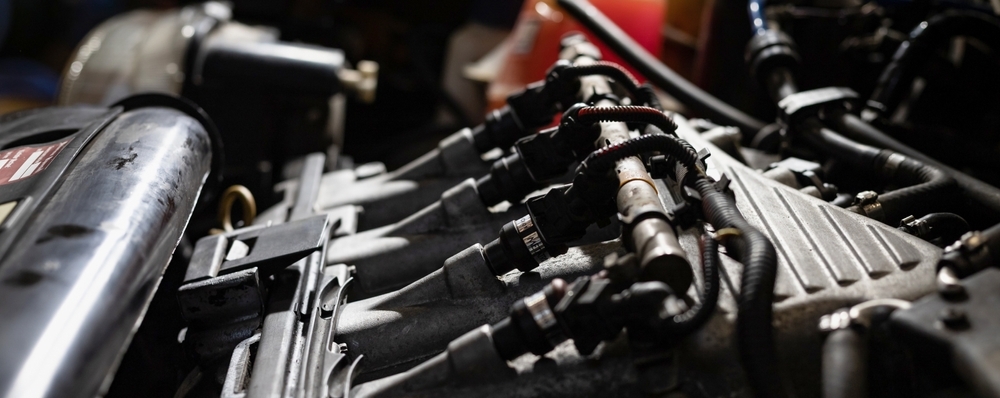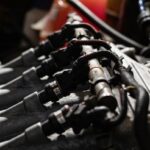
30 May My Car’s Fuel System: Understanding & Trouble Shooting
 The longer you own your car, the more debris, varnish, and carbon deposits form on the fuel system components. These build-ups can lower your vehicle’s performance and affect fuel efficiency. Performing routine maintenance can help prevent fuel system issues like a clogged fuel filter, dirty fuel injectors, and a faulty fuel pump. Let’s review how the fuel system works so you can better understand why auto maintenance is so important.
The longer you own your car, the more debris, varnish, and carbon deposits form on the fuel system components. These build-ups can lower your vehicle’s performance and affect fuel efficiency. Performing routine maintenance can help prevent fuel system issues like a clogged fuel filter, dirty fuel injectors, and a faulty fuel pump. Let’s review how the fuel system works so you can better understand why auto maintenance is so important.
How A Fuel System Works
Where it all begins—A car’s gas tank holds most of the gas in the fuel system. The tank fill hole can be on either the vehicle’s driver’s or passenger’s side. After adding fuel to the tank, the gas cap seals the opening, creating an airtight environment. The fuel then passes through a few steps before it reaches the engine.
Fuel Pump
In general, the fuel pump resides in the gas tank. It moves fuel from the tank through the fuel lines to other components in the fuel system. It is not uncommon for some vehicles to have more than one fuel pump, but the fuel system still works the same way. The advantage of multiple fuel pumps is that gasoline cannot move from one side of the gas tank to the other when turning or driving on an incline, leaving the fuel pumps dry. At least one pump will always have fuel going to it.
Fuel Lines
The fuel pump moves gas into the fuel lines. Most vehicles have rigid metal fuel lines that carry gasoline from the tank towards the engine. They run next to parts of the car where they will be protected from the elements and not get too hot from the exhaust or other components.
Fuel Filter
Before it reaches the engine, the gasoline must pass through the fuel filter. The filter removes impurities and particulates from the gas before entering the engine. A clean fuel filter is vital to a long-lasting and clean-running engine. Once the gasoline is through the fuel filter, it moves to the pressure regulator.
Fuel Pressure Regulator
All fuel systems have an optimum pressure at which they have to run. On older carbureted engines, this pressure is fairly low (3-5 PSI). The pressure is much higher on multi-port electronic fuel injection systems (50-90 PSI). Each system will have a regulator that corrects the fuel volume and pressure. While fuel pressure regulators rarely fail, when they do, they can create problems with engine performance, stalling, and starting issues.
Fuel Injection
Electronic fuel injection uses the fuel pressure regulator to maintain a steady flow of pressure. This pressure draws fuel into the fuel injectors, which spray a gas mist into the combustion chambers.
- Single-point fuel injection systems introduce gasoline into a throttle body mixed with air. This air/fuel mixture then enters all the combustion chambers as needed.
- Direct fuel injection systems (or port fuel injection) have injectors that deliver fuel directly into the individual combustion chambers, with at least one injector per cylinder.
Troubleshooting Fuel System Issues
Now that you have a better idea of how fuel moves through the fuel system let’s look at some common issues that can occur.
Faulty Fuel Pump(s)
Technically, fuel pumps are not included in a routine maintenance service and only need replacement when they fail. Most auto manufacturers indicate that fuel pumps should last over 100,000 miles under ‘normal driving conditions.’ A lack of fuel due to a faulty fuel pump is a common problem preventing a car from starting.
- Decreased fuel economy
- Engine stalls under heavy load or strain
- Engine won’t start
- Overheating engine
- Rough idle or sputtering
- Unexpected acceleration or power surges
- Whining noise from the gas tank
Clogged Fuel Filter
As fuel flows through the filter, pleated material strains out dirt, salt, moisture, or debris from the gas station’s storage tank. When a clogged fuel filter fills with particulates, it restricts fuel flow to the engine, creating numerous issues. Most vehicles’ fuel filter replacement interval is every 20,000 to 30,000 miles.
- Check Engine light is lit
- Decreased fuel economy
- Engine runs rough or stalls
- Engine won’t start
- Fuel pump quits
- Power loss when under heavy load or strain
Dirty Fuel Injectors
A fuel injector is an important fuel injection system component found in most modern vehicles. Fuel injectors supply fuel to the car’s engine. Usually, if the vehicle has a dirty fuel injector, it can cause issues like:
- Check Engine light is lit
- Engine misfires
- Fuel leaks
- Increased fuel use
- Noticeable gas smell in the cabin
- Rough idle or stalls
- Vibrating engine
Fuel System Cleaning & Repairs
Plymouth Auto & Tire Center offers a revolutionary Fuel Carbon Cleaning System process that cleans your vehicle’s fuel system and removes harmful carbon deposits. Our cleaning system uses a detergent that soaks into carbon deposits and softens them so they pass through the exhaust. The cleaning solution will not damage your vehicle’s sophisticated engine components.
The Automotive Maintenance and Repair Association suggests scheduling this service every 15,000 – 18,000 miles. Routine cleaning of your vehicle’s fuel system is the best way to improve performance and acceleration and increase fuel economy.
Schedule Fuel System Service
Contact us today at (610) 825-6558 to request a fuel injection service appointment. We will happily address a clogged fuel filter, dirty fuel injectors, or fuel pump issues.

